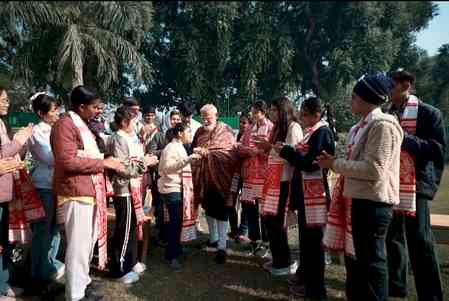Panjab University Bags Another Patent for Innovative Breakthrough
Panjab University (PU), Chandigarh team Prof. Rohit Sharma, Dr. Monika Sharma and Dr. Shallu Goyal have been granted Patent for their innovative work titled “Anti-cancer efficacy of crude and purified bio-active fractions from the leaf extracts of Lagerstroemia reginae against Pancreatic cancer.”

Chandigarh, November 12, 2025: Panjab University (PU), Chandigarh team Prof. Rohit Sharma, Dr. Monika Sharma and Dr. Shallu Goyal have been granted Patent for their innovative work titled “Anti-cancer efficacy of crude and purified bio-active fractions from the leaf extracts of Lagerstroemia reginae against Pancreatic cancer.”
The patent, awarded to the University by the Indian Patent Office, recognises their pioneering contribution to the discovery and development of natural, plant-derived compounds with potent anti-cancer activity, specifically targeting pancreatic cancer, one of the most aggressive and treatment-resistant forms of cancer worldwide.
Building upon this patented innovation, the research team plans to advance pre-clinical studies to further evaluate the pharmacological mechanisms and optimise formulations for therapeutic applications. The ultimate goal is to translate this discovery into clinically viable, plant-based anti-cancer therapeutics that can improve patient outcomes and enhance treatment accessibility.
This discovery highlights the potential of botanical compounds as safer, sustainable, and cost-effective alternatives to conventional chemotherapeutic drugs, offering a promising pathway toward next-generation, plant-based cancer treatments. Key advantages of the invention include a novel process of isolation of active principle showing targeted action against pancreatic cancer, a natural and sustainable origin, reduced toxicity, cost-effective and scalable and potential for drug development.
“This patent is a reflection of PU’s commitment to advancing translational research with real-world health impact,” said Prof. Rohit Sharma. “Our findings open new directions for safer, more sustainable, and biologically inspired cancer treatments.”



 City Air News
City Air News 










